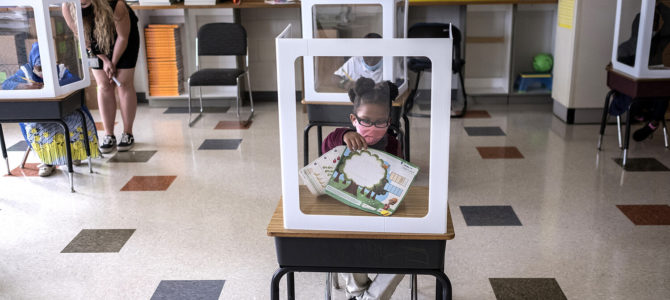
After more than a year of remote learning, students in New York City finally went back to school. Sadly, the city’s Department of Education fear of COVID-19 and servitude to teachers’ unions means that these schools will more closely resemble Siberian gulags than places of learning.
A recent opinion piece in the New York Post details the ridiculous lengths that many of Gotham’s schools are going to in order to defeat the virus, including “masked and distanced” recess, health concerns over many sports and other extracurricular activities that require “increased exhalation,” and the cancellation of field trips, group projects, and class parties. Despite returning to school, New York City kids are still forbidden from connecting meaningfully with their peers.
Ask any homeschooling parent to discuss the pushback that he’s received from friends and family over the years and he’ll tell you that the need for his children to be “properly socialized” has topped the list of concerns. “How will your kids learn to interact with different kinds of people if they don’t go to school?” these mostly well-meaning people ask, implying that learning at home will doom your children to a life of misanthropic isolation.
The long-standing myth that homeschooled children grow up to be socially awkward is easily debunked because it proceeds from the false (indeed, patently absurd) premise that, prior to the advent of mass public schooling in the mid-nineteenth century, children did not learn to get along with either their peers or other social groups. This myth persists despite multiple studies that reveal that a majority of homeschooled children are just as well-socialized (or even better socialized) than their public school peers. The socialization process is somewhat different for homeschooling parents, but these differences (largely in parental supervision and diversity of age range in social groups) are key benefits of homeschooling, not flaws.
For decades, members of the educational establishment have used the need for socialization to argue that kids are better off in government-run schools than being taught at home. Recent developments in American education during the Age of COVID, however, reveal that this argument is not just fundamentally flawed, but officially dead.
Newsflash: Masks and Social Distancing Make Socialization Difficult
Claims about the social benefits of modern K-12 education never made much sense to begin with. In this model, instead of organically meeting and interacting with others through a variety of community institutions (neighborhoods, churches, etc.), children spend most of their social time being forced to engage with a very small subset of individuals: those who were born within a few months of them. This artificial social situation exists nowhere else in American society; only in schools do we see such limits imposed on human interaction. As Sal Khan, the founder of Khan Academy, wrote in 2012, “There is nothing natural about segregating kids by age. That isn’t how families work; it isn’t what the world looks like and it runs counter to the way that kids have learned and socialized for most of human history…”
In response to COVID-19, most schools have doubled down on this artificiality by imposing further strictures on their young charges, such as mask mandates and social distancing. Leaving aside the question of whether such strictures are even necessary given the low risk that COVID-19 poses to children, there is little doubt that they interfere with the school’s supposedly important mission of socialization.
The masks touted as a sine qua non by the CDC and teachers’ unions block children’s recognition and understanding of vital nonverbal communication cues, especially at younger ages. Social distancing expectations limit their interaction in school-based nonacademic situations, such as recess and extracurricular activities. As for remote learning, the educational “nuclear option” against the spread of the virus, one need only look at the various pre-pandemic studies on the damaging effects of screen time on child development to see the problems with this approach to both education and socialization.
When parents speak up regarding these matters, the educational establishment usually replies with some variation on “Hey, kids are resilient.” This is certainly true, but the fact that the educrats are willing to blithely dismiss these legitimate concerns reveals that any claims about the vital role of schools when it comes to proper socialization are hollow at best.
Not All Socialization Is Healthy
But that didn’t stop the educrats from claiming otherwise in order to maintain their power over American children. As schools started to emerge from lockdown at the end of 2020, stories about the lockdown’s negative effects on the mental health of students began to appear. The social isolation caused by remote learning, these articles said, confirmed the important role of government-run schools in the proper socialization of students.
Yet as any student will tell you, not all social interaction is positive. Bullying (both physical and digital) is on the rise in our schools, resulting in a documentable correlation between the beginning of the school year and feelings of depression and even thoughts of suicide in students. Is such emotional turmoil really a sign that our schools are providing proper socialization?
Common sense suggests that a socially well-adjusted student should be able to weather temporary bouts of social isolation by relying on other mental resources. Given the struggles of students during the pandemic, what passes for socialization in schools is more of a crutch for students to lean on than a set of tools for preserving their mental health. Take that crutch away in a lockdown and the students collapse.
Homeschooled children are certainly not immune from depression or other forms of mental illness, but their situation allows for greater social stability and positive interaction in the face of COVID-19. Their social circle is founded not on a massive faceless institution, but on the more intimate confines of the home and family. The greater degree of control that responsible parents have over the social circle of their homeschooled children both expands the number and types of people they interact with while limiting negative socialization.
As homeschooling continues to grow, we should expect the educational establishment to continue to push aggressively for children to return to the “care” provided by government schools. Because these schools have clearly failed to provide opportunities for healthy and effective socialization both prior to and during the pandemic, homeschooling parents can feel free to ignore the socialization argument that educrats will inevitably put forward.








